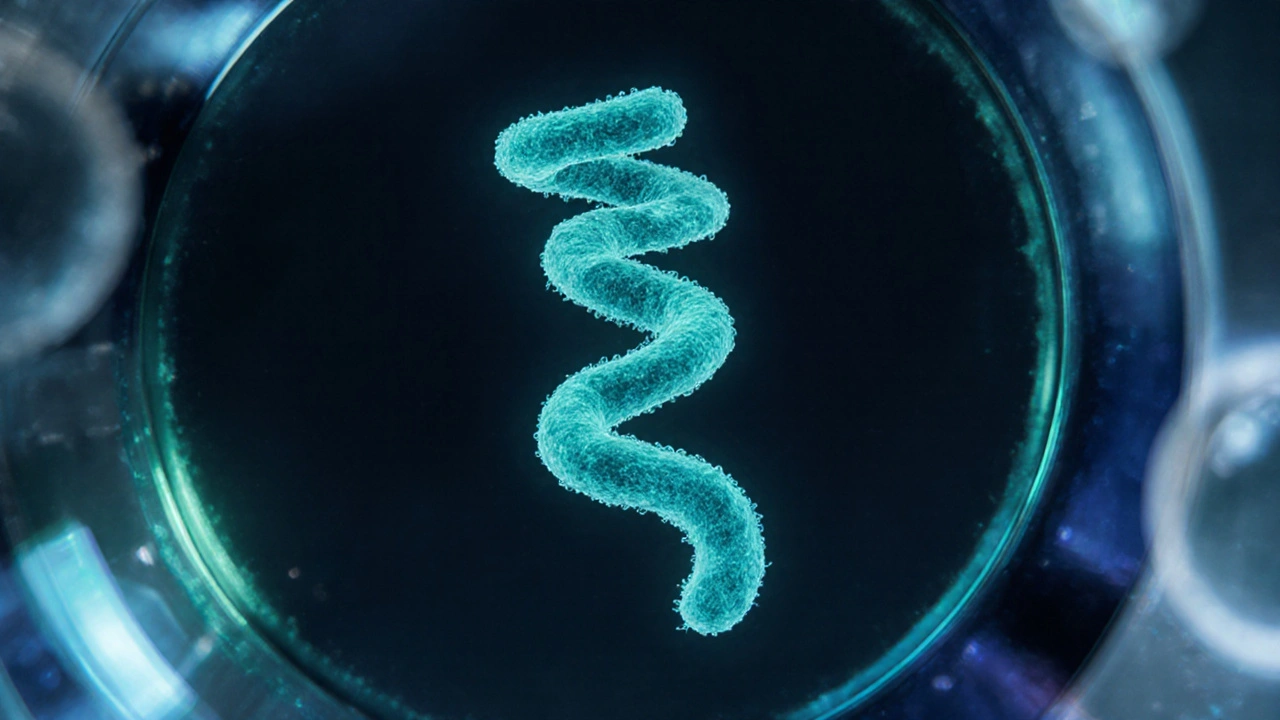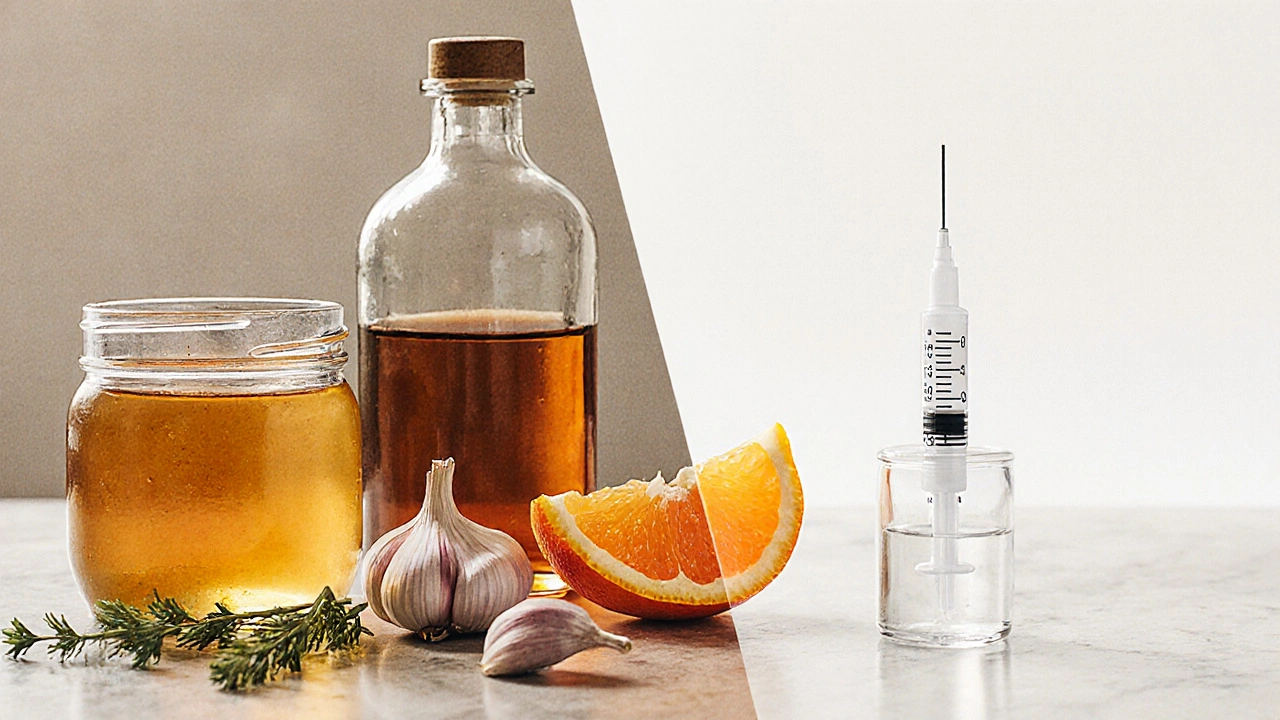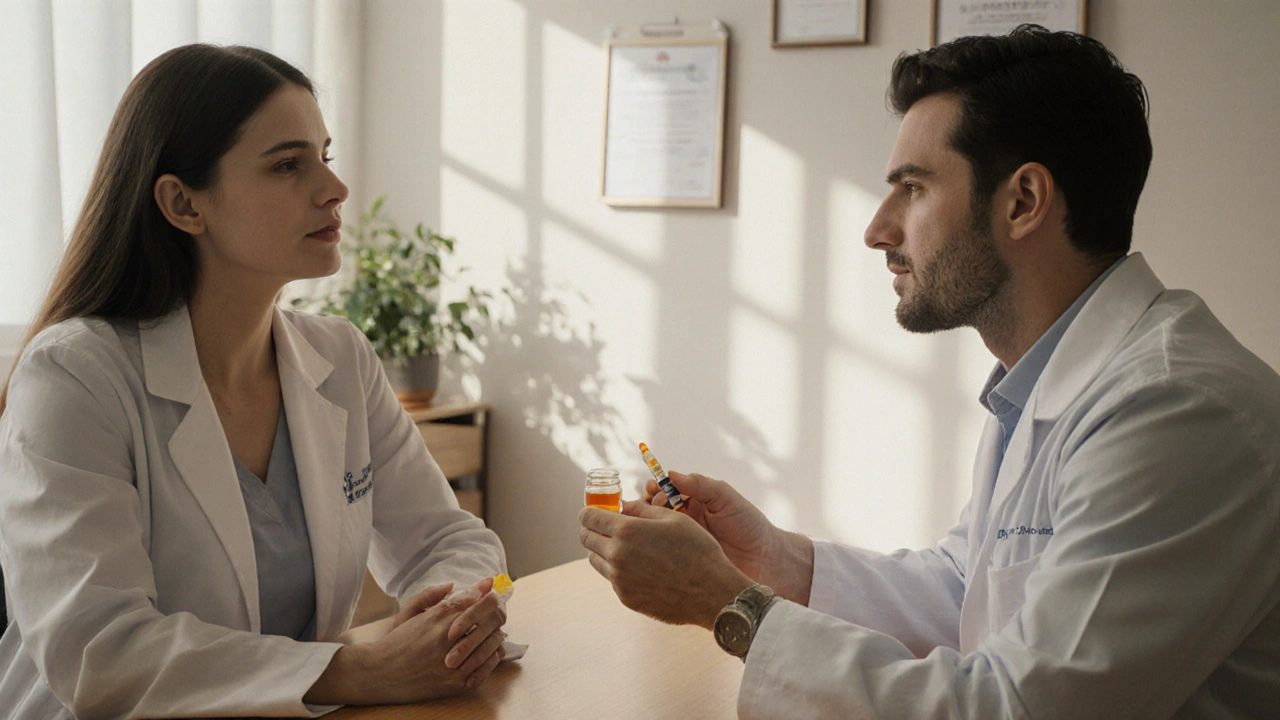Syphilis and Alternative Medicine: How Effective Are Natural Remedies?
 Oct, 6 2025
Oct, 6 2025
Syphilis Treatment Effectiveness Checker
Select a treatment option and syphilis stage, then click "Check Treatment Effectiveness" to see detailed information about effectiveness and safety.
When a diagnosis of Syphilis is confirmed, many people wonder if there are natural ways to fight the infection instead of, or alongside, standard antibiotics. This article breaks down what the disease actually is, why conventional treatment matters, which natural approaches are popular, and what the science really says about them.
Understanding Syphilis
Treponema pallidum is the spiral-shaped bacterium that causes syphilis. It spreads mainly through sexual contact, but can also be transmitted from mother to baby during pregnancy. The infection progresses through four stages-primary, secondary, latent, and tertiary-each with its own set of symptoms ranging from painless sores to serious organ damage.
Because the bacteria can hide for years, early detection is crucial. Tests that detect antibodies or the bacteria itself are widely available at clinics and pharmacies.
Why Penicillin Remains the Gold Standard
Since the 1940s, Penicillin has been the first‑line treatment for all stages of syphilis. A single intramuscular dose can clear a primary infection, while later stages may need a longer course. The drug works by disrupting the bacterial cell wall, leading to rapid death of Treponema pallidum. Modern guidelines from health authorities such as the CDC report cure rates above 95% when administered correctly.
Skipping or delaying penicillin increases the risk of irreversible damage to the heart, brain, and other organs. That’s why doctors stress that natural remedies should never replace antibiotics for syphilis.
The Appeal of Alternative Medicine
Alternative medicine draws people who want to avoid injections, fear side effects, or simply prefer “natural” solutions. Online forums, wellness blogs, and some holistic practitioners often highlight herbs, foods, and essential oils as potential allies against infection.
Common claims include boosting the immune system, creating an environment hostile to the bacteria, or even directly killing the pathogen. While the intentions are good, the evidence varies dramatically.

Natural Remedies People Talk About
- Garlic: Fresh cloves are said to have antimicrobial properties thanks to allicin.
- Honey, especially Manuka: Often touted for wound healing and antibacterial action.
- Tea tree oil: Used topically for skin lesions; its terpinen-4-ol component is believed to be antimicrobial.
- Echinacea: Popular as an immune booster during the secondary stage when rashes appear.
- Vitamin C: High-dose supplementation is sometimes recommended to support overall immunity.
These items are easy to find in grocery stores or health shops, which adds to their appeal. But ease of access doesn’t equal clinical effectiveness.
What the Science Says
Researchers have examined several of these claims, often with mixed results:
- Garlic: In vitro studies show allicin can inhibit a range of bacteria, yet no human trials have demonstrated clearance of Treponema pallidum. The concentration required to affect the spirochete is far higher than what can be achieved through diet.
- Honey: Manuka honey exhibits activity against Staphylococcus aureus and some Gram‑negative bacteria. However, the porous nature of syphilitic sores limits honey’s ability to penetrate deep tissues where the spirochete resides.
- Tea tree oil: Laboratory tests confirm a broad antimicrobial spectrum, but skin irritation is a common side effect. Applying it to a syphilis chancre could worsen inflammation and delay healing.
- Echinacea: Clinical trials on respiratory infections show modest benefits, but no data link it to syphilis outcomes. Its immune‑modulating effect is too non‑specific to target the bacteria.
- Vitamin C: High doses are safe for most adults, yet studies on bacterial infections show no direct bactericidal action. It may help overall health but won’t replace antibiotics.
Overall, the highest level of evidence-randomized controlled trials-are missing for all these remedies when it comes to treating syphilis. Most data come from laboratory experiments that don’t reflect the complexity of an infection inside the human body.
Safety Concerns and Interactions
Even if a natural product isn’t harmful on its own, mixing it with prescribed antibiotics can cause problems. For example, garlic can interfere with the metabolism of certain drugs, potentially altering penicillin levels. Essential oils like tea tree oil may cause allergic reactions or skin burns if applied undiluted.
Patients with allergies, pregnancy, or chronic conditions should discuss any supplement with a healthcare professional before adding it to their regimen.

Integrating Complementary Approaches Responsibly
If you choose to use natural remedies alongside standard treatment, follow these guidelines:
- Never skip the antibiotic dose prescribed by your doctor.
- Use natural products only as supportive care-e.g., a honey dressing for a non‑infected wound, or garlic in cooking for general health.
- Monitor symptoms closely. If sores worsen, fever appears, or you notice new neurologic signs, seek medical attention immediately.
- Document any supplements you take and share the list with your clinician.
These steps help ensure that complementary methods add comfort without compromising the cure.
Quick Takeaways
- Penicillin is the only proven cure for syphilis; rely on it.
- Laboratory studies suggest some natural agents have antibacterial activity, but they lack clinical proof against Treponema pallidum.
- Safety is a real issue-topical oils can irritate, and certain herbs may interact with meds.
- Use natural remedies only as adjuncts, not replacements.
- Always keep your healthcare provider in the loop.
| Remedy | Evidence Level | Typical Use | Safety Concerns |
|---|---|---|---|
| Penicillin | Randomized controlled trials - high | Intramuscular injection (single or multiple doses) | Allergic reactions in ~10% of patients |
| Garlic (raw) | In‑vitro studies - low | Dietary supplement, topical paste | Potential drug interactions, GI upset |
| Manuka honey | In‑vitro & small wound‑care studies - low | Topical dressing for skin lesions | Allergy in honey‑sensitive individuals |
| Tea tree oil | In‑vitro studies - low | Diluted topical application | Skin irritation, allergic dermatitis |
| Echinacea | Clinical trials for colds - moderate | Oral supplement | Autoimmune flare‑ups in rare cases |
| Vitamin C (high dose) | Observational studies - low | Oral supplement | Kidney stones at very high doses |
Frequently Asked Questions
Can I treat syphilis with garlic alone?
No. While garlic shows antibacterial activity in the lab, the amount needed to kill Treponema pallidum far exceeds what is safe to consume. Penicillin remains the only clinically proven cure.
Is it safe to apply tea tree oil on a syphilitic sore?
Applying undiluted tea tree oil can irritate the skin and may delay healing. If you insist on using it, dilute it properly and monitor for any worsening of the lesion.
Do natural remedies boost the effectiveness of penicillin?
There is no solid evidence that herbs or supplements enhance penicillin’s ability to eradicate syphilis. Some supplements might even interfere with drug metabolism, so discuss any additions with your doctor.
What signs indicate I need urgent medical care?
New neurological symptoms (headache, vision changes), chest pain, severe rash, or any sudden worsening of sores should trigger immediate medical attention. These can signal progression to secondary or tertiary stages.
Can I use honey as a wound dressing while on antibiotics?
A sterile honey dressing can help keep a wound moist and may reduce bacterial load on the surface, but it should not replace proper wound care or the antibiotic regimen prescribed for syphilis.

Jean Tredoux
October 6, 2025 AT 14:29They’re hiding the real cure in plain sight, but the powers that be won’t tell you.
cedric Gicquiaud
October 7, 2025 AT 13:09Look, the pharmaceutical giants have been feeding us a spoonful of penicillin while whispering about “natural miracles” as if it were some secret plot. They want you to believe that garlic or tea tree oil can replace a life‑saving antibiotic, but the evidence is as thin as the paper they print their brochures on. I’ve seen the supply chains, the lobbyists, the back‑room deals – it’s all orchestrated. Don’t be fooled by glossy blog posts; the only thing that cures syphilis is proven penicillin, not the latest Instagram‑trend. The moment you start substituting, you’re playing into their hands.
Mason Grandusky
October 8, 2025 AT 11:49Alright, let’s get real-penicillin is the heavyweight champ in the ring, but why do we keep chasing kale smoothies and honey drizzles? The human body is a marvel, and a little vitamin C or a dab of manuka can soothe the skin, but they’re not the knockout punch against Treponema pallidum. Think of antibiotics as the fire engine, and natural remedies as the fire extinguisher you keep on the wall-helpful for small sparks, useless for a raging blaze. If you’re already on the right track with penicillin, adding a honey dressing might just keep the wound comfortable. Still, don’t mistake comfort for cure; the science is crystal clear.
Spencer Riner
October 9, 2025 AT 10:29Syphilis is a master of disguise, slipping from primary sores to hidden latent phases. The crucial point is early detection; the moment you miss it, you’re handed a ticket to complications. Penicillin’s track record is undeniable-over 95 % cure rates when administered properly. Natural supplements might boost overall immunity, but they don’t target the spirochete directly. Stick to the evidence, and keep the alternative stuff as complementary care only.
Joe Murrey
October 10, 2025 AT 09:09Yo, the article is spot on-penicillin rules. Garlic and honey are cool for everyday health but cant beat the bug. If u got the meds, take ’em, dont skimp.
Tracy Harris
October 11, 2025 AT 07:49Permit me to articulate, with the gravitas this subject deserves, that the efficacy of penicillin stands as a paragon of modern medicine. Its mechanism, a disruption of the bacterial cell wall, eradicates Treponema pallidum with unrivaled precision. The allure of “natural” cures often masks a perilous naiveté, fostering false hope. While adjunctive measures may afford symptomatic relief, they are no substitute for the proven regimen. Hence, one must eschew conjecture and embrace the validated therapeutic pathway.
Sorcha Knight
October 12, 2025 AT 06:29Drama alert! 🌟 You can’t just sprinkle garlic on a syphilis sore and expect a miracle-penicillin is the real hero. Those “natural” hacks are like costume accessories: they look cool but don’t save the day. Keep the drama on the stage, not in your bloodstream! 😤
Jackie Felipe
October 13, 2025 AT 05:09I hv read a lot about this, and i think the info is clear. Penicillin works, other stuff does not. Some people get confused by the hype. Please dont waste time on unproven herbs.
debashis chakravarty
October 14, 2025 AT 03:49Allow me to correct the record: the phrase “in‑vitro studies” does not equate to clinical efficacy. One must differentiate between laboratory assays and randomized controlled trials. The latter are the gold standard, and only penicillin meets that criterion for syphilis. Moreover, presenting anecdotal successes as evidence is a logical fallacy. Please, let us uphold rigorous scientific standards.
Daniel Brake
October 15, 2025 AT 02:29It is worth noting that syphilis progresses silently in its latent stage, rendering superficial remedies ineffective. The pathogen resides deep within tissues, beyond the reach of topical agents. Consequently, systemic antibiotics remain indispensable. While encouragement of holistic health is admirable, it must not eclipse the necessity of proven pharmacotherapy. The balance lies in supporting overall wellness, not substituting it for cure.
Emily Stangel
October 16, 2025 AT 23:49From a clinical perspective, the management of syphilis demands a disciplined approach rooted in evidence‑based practice. Penicillin, administered intramuscularly in accordance with CDC guidelines, yields cure rates exceeding ninety‑five percent across all disease stages. This remarkable efficacy is underpinned by robust pharmacodynamics, whereby the β‑lactam ring binds irreversibly to penicillin‑binding proteins, culminating in bacterial lysis. In contrast, the purported benefits of adjunctive natural agents-garlic, manuka honey, tea‑tree oil, echinacea, and high‑dose vitamin C-derive principally from in‑vitro observations or limited wound‑care studies, none of which translate into demonstrable eradication of Treponema pallidum in vivo. While these substances may confer ancillary advantages, such as modest anti‑inflammatory effects or superficial antimicrobial activity, they cannot substitute for the systemic bactericidal action of penicillin. Moreover, the pharmacokinetic barriers inherent to topical applications impede adequate tissue penetration, a prerequisite for addressing the spirochete’s proclivity for deep vascular niches. Safety considerations further temper enthusiasm for unregulated herbal use; for instance, allicin in garlic can potentiate cytochrome P450 interactions, potentially altering the metabolism of concurrently administered antibiotics. Similarly, undiluted tea‑tree oil is notorious for causing contact dermatitis, which may exacerbate lesion integrity and impede healing. The integration of complementary therapies should therefore be predicated on a risk‑benefit analysis conducted collaboratively with a qualified healthcare professional. Documentation of all supplemental agents, dosing regimens, and observed adverse effects is essential to safeguard patient safety and ensure optimal therapeutic outcomes. Finally, vigilance for clinical deterioration-such as the emergence of neurologic manifestations, cardiac involvement, or persistent cutaneous lesions-remains paramount, warranting immediate medical reassessment. In sum, the cornerstone of syphilis treatment unequivocally remains penicillin, with natural remedies relegated to supportive, non‑curative roles under professional supervision.
Suzi Dronzek
October 17, 2025 AT 22:29It is disheartening to observe the proliferation of pseudoscientific claims that masquerade as viable alternatives to proven therapy. The rigorous clinical trials that affirm penicillin’s superiority cannot be dismissed in favor of anecdotal testimonies concerning herbal concoctions. While I acknowledge the cultural allure of “natural” remedies, the primary obligation of any responsible practitioner is to prioritize patient safety and therapeutic efficacy. Consequently, any adjunctive approach must be thoroughly vetted, and the patient must be fully informed of the limitations inherent to such measures. In the final analysis, the medical community must remain steadfast in championing evidence‑based interventions while offering compassionate guidance on complementary practices.
Aakash Jadhav
October 18, 2025 AT 21:09Yo, drama aside – penicillin is the real MVP. Those honey drops look sweet but won’t take out the spirochete. Keep the hype in movies, not in your bloodstream.
Amanda Seech
October 19, 2025 AT 19:49Hey everyone, just wanted to add that I’ve seen folks try garlic and honey and feel better, but it’s really the antibiotics doing the heavy lifting. If you’re on penicillin, that’s the main thing. Adding a little honey on a sore can keep it moist, that’s all. Stay safe and keep the doctor in the loop!
Lisa Collie
October 20, 2025 AT 18:29One must question the naive optimism that places “natural” cures on a pedestal equal to rigorously tested antibiotics. The intellectual elite understand that anecdote does not substitute for randomized data. While the layperson may romanticize herbal lore, the scientifically literate recognize the hierarchy of evidence. It is therefore prudent to maintain a skeptical stance toward such claims, regardless of their popularity.
Avinash Sinha
October 21, 2025 AT 17:09Picture this: a golden drizzle of manuka honey over a syphilitic lesion, shimmering like sunrise-so poetic, yet the spirochete remains unfazed. The drama of nature’s bounty is undeniable, but the battlefield demands a bullet, not a blossom. Penicillin delivers that decisive strike. Let the honey be a garnish, not the main course.
ADAMA ZAMPOU
October 22, 2025 AT 15:49In accordance with the established corpus of medical literature, it is incumbent upon clinicians to delineate the epistemic boundaries between empirically validated pharmacotherapy and adjunctive naturopathic interventions. The pharmacokinetic profile of benzathine penicillin G ensures sustained serum concentrations adequate for spirochetal eradication-a fact substantiated by longitudinal cohort analyses. Conversely, agents such as allicin, methylglyoxal, and ascorbic acid, while possessing in‑vitro antimicrobial properties, lack the requisite bioavailability to effectuate systemic clearance of Treponema pallidum. Therefore, while the incorporation of supportive nutraceuticals may be afforded as a measure to enhance patient comfort, they must be expressly contextualized as ancillary, not curative. Such a framework safeguards both clinical integrity and patient autonomy.
Liam McDonald
October 23, 2025 AT 14:29I appreciate the thoroughness of the article and the emphasis on evidence based treatment penicillin is the gold standard for syphilis it works well the complementary tips are nice but not essential thanks for the clear guidance
Adam Khan
October 24, 2025 AT 13:09The data unequivocally validates penicillin as the sole pharmaco‑strategic vector with statistically significant cure rates; any deviation towards herbal adjuncts dilutes therapeutic fidelity and risks national health security. Moreover, the lexicon of “alternative” is weaponized by fringe factions seeking to erode evidence‑based protocols, thereby compromising public health imperatives. Jargon such as “immune boosting” is a euphemism for unsubstantiated claims lacking randomized control parameters. In the interests of maintaining clinical rigor, policy must enforce adherence to CDC guidelines whilst tolerating only evidence‑backed supplemental measures. Failure to do so engenders a cascade of preventable morbidity and undermines our collective biomedical infrastructure.